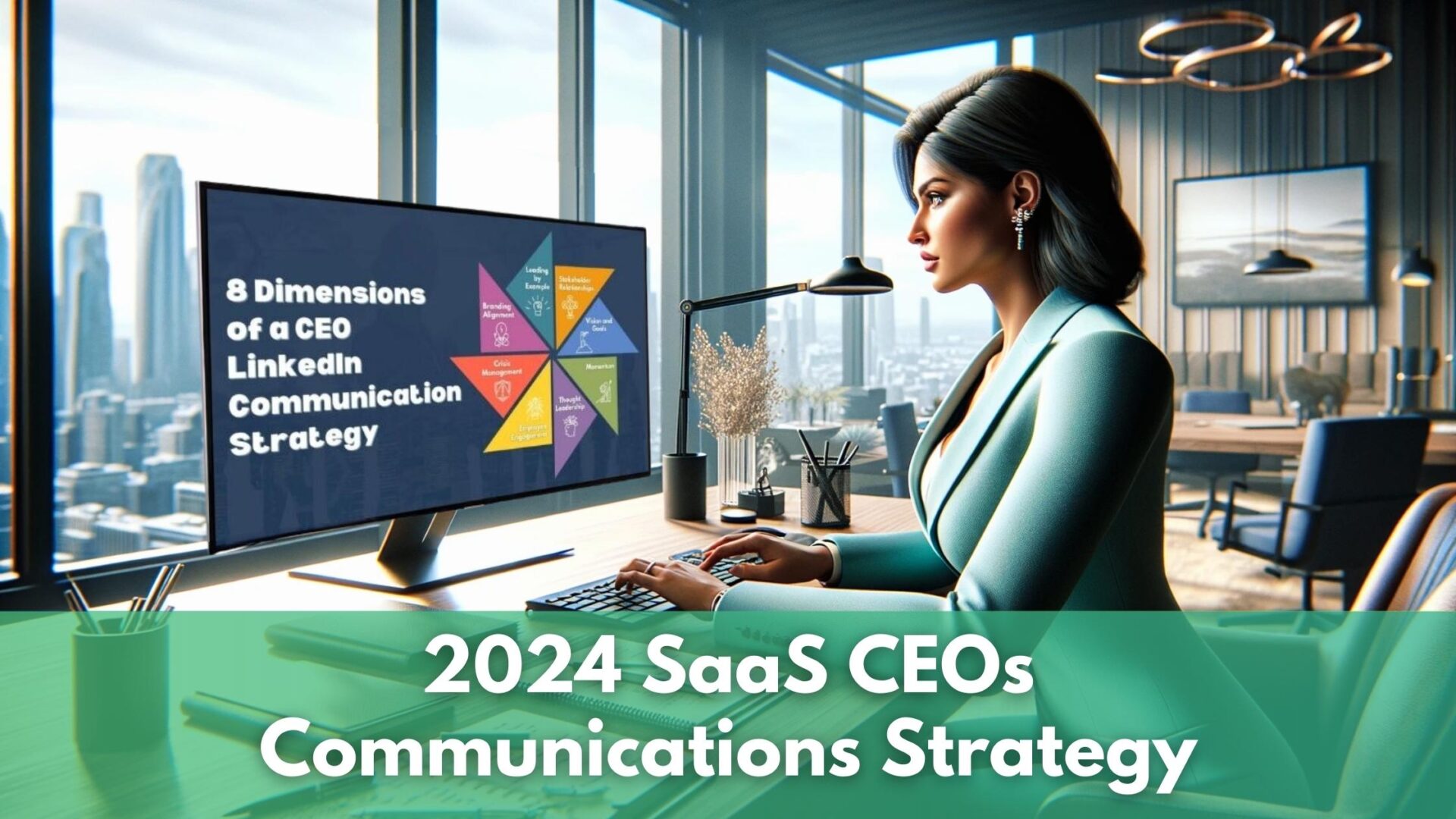As we publish this blog, there are 32 days left in 2023. I’m feeling that crazy, end-of-the-year, new-year-coming-quickly urgency, are you?
Even as I anticipate holiday gatherings and magic with my family and friends, I’m focused on what I need to do right now to lead my company and team to success in 2024.
I’m also thinking about our clients. To help them prepare for and execute well in Q1, we’re busy holding planning sessions to think proactively about each aspect of their CEO communications strategy.
If you are taking time to think and plan this month, you can do this for yourself.
Start with our earlier blog, where we identified the 8 key components of a successful CEO communications strategy and how to use LinkedIn effectively in each area.
Some of those areas will be more relevant than others in Q1. For each, what do people need to hear from you?
Your plan will be uniquely yours, but consider these questions to get started:
#1 Momentum:
What do you anticipate in Q1 that will demonstrate momentum? New funding or partnerships? Product launches? It’s impossible to predict precisely what next year holds, but consider posting monthly about your traction. While you can capitalize on events as they unfold, communicating consistent momentum is always a wise strategy. Planning now means you can do that proactively.
#2 Vision and Goals:
What elements of your vision need to be made more clear? Is there a nuance — or maybe even a fundamental principle — that your customers and partners do not fully appreciate? Which points warrant re-emphasis for clearer understanding? Consider planning one post a month about your vision for your business.
#3 Leading by Example:
What behaviors do you hope to see consistently from your team? Regularly — visibly — exemplifying these behaviors can inspire your team to follow suit. Modeling a behavior is more effective than wishing or nagging, and LinkedIn provides visibility without resorting to either one.
#4 Stakeholder Relationships:
Which stakeholders do you want to build deeper relationships with? Are there areas where you’d like to establish new or stronger connections? Leverage LinkedIn to foster communication and connections with your diverse stakeholders.
Identify each group and determine the specific messages they need to hear directly from you. Develop a sustainable posting schedule that addresses all these angles.
Encourage engagement by using questions and polls, allowing stakeholders to interact with you and fostering an environment where they can come to know, like, and trust you.
#5 Thought Leadership:
What upcoming developments in the next quarter could you amplify on LinkedIn? What topics are you personally interested in discussing? Ideally, aim for a monthly long-form thought leadership post, but once a quarter may be enough.
You can also show thought leadership with shorter posts that share your insights or interpretation of events.
#6 Employee Engagement:
As your company grows, you need to think more about employee engagement. Consider how you can encourage, align, and connect with your team. And if you’re growing rapidly, lean into the culture with posts reinforcing your company’s values. What should you talk about in the next three to six months to keep everyone aligned?
#7 Branding Alignment:
Speaking of alignment, be sure your presence is aligned with the company branding (and your team’s is, too). Evaluate your online presence — do you need to change anything to stay in alignment? If you are rebranding (or considering it), factor that into the plan. Consider strategically revealing the behind-the-scenes work on the rebranding, so people know it’s coming.
#8 Crisis Management:
Fully anticipating a crisis is impossible — that’s the nature of a crisis. But you can develop a plan of who will need to hear directly from you, and LinkedIn offers CEOs a platform to tell your story, get feedback, and guide the narrative. Meanwhile, a track record of being consistently communicative and open to feedback will serve you well if you do run into a crisis.
Make LinkedIn Work for You
If you’re in a business where you can plan for a full year at one time, draft a CEO communication strategy for all of 2024. But SaaS moves very quickly, and with advancements in AI already hard to keep up with, yearlong planning may not be possible. Still, develop a solid plan for Q1 and a rough outline for Q2.
CEOs who fully invest in this planning now will reap the benefits in the months to come. But those same savvy leaders will hand off the implementation to their team or outsource it. We’re partial to outsourcing (for obvious reasons), but either way, the results will be better for having the CEO’s input into the strategy.
Ready to leverage the power and reach of LinkedIn? If you are too busy now to plan your CEO communication strategy for 2024 or feel like your plan could be better, our team can help. Reach out to me on LinkedIn or schedule a quick call.

